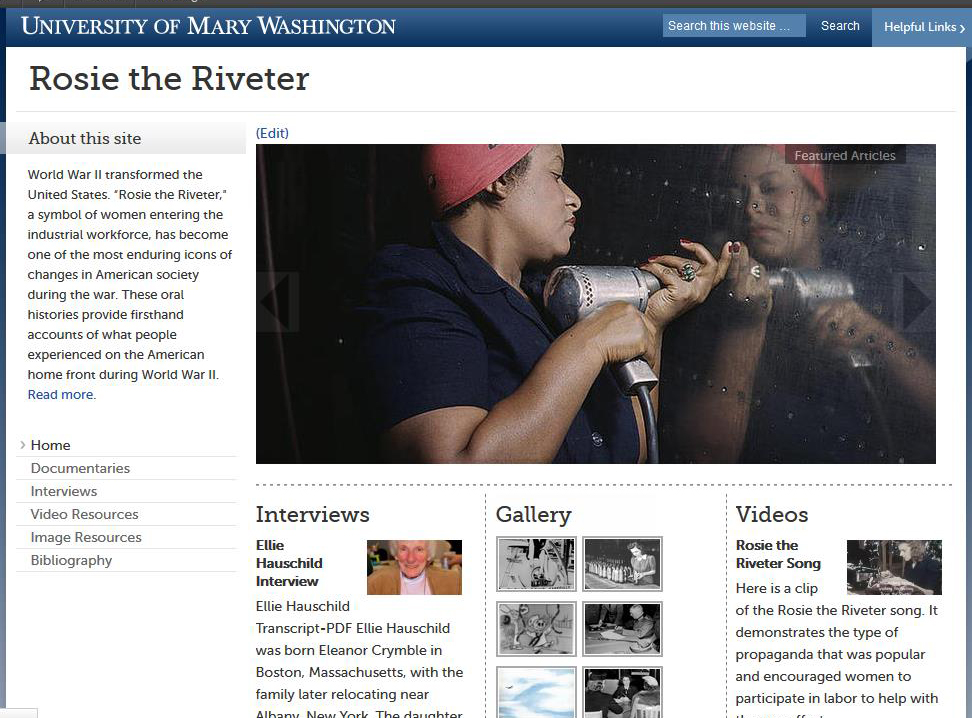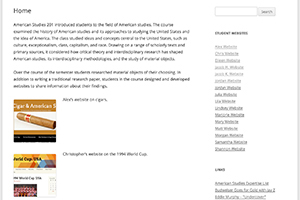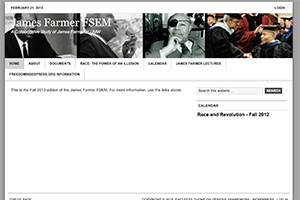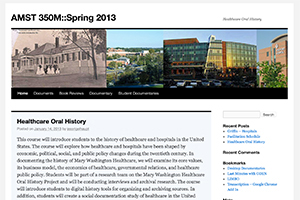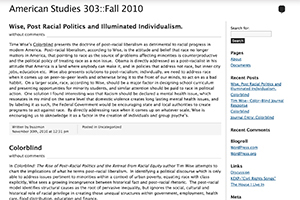“Born Digital: Teaching Oral History to Create Public History”
This is a recording of my presentation on oral history, public history, teaching, and digital tools at the 2013 joint meeting of the Oral History Mid-Atlantic Region (OHMAR) and the Society for the History in the Federal Government (SHFG).
I teach courses in history and American studies, including Introduction to American Studies, the politics and culture of the 1960s, civil rights movements in the twentieth century United States, labor history, oral history, and prisons in America. I am one of ten faculty members who created a new interdisciplinary multi-section first-year seminar on James Farmer and civil rights. These are a selection of my course websites. They were developed on UMWBlogs with WordPress.
Oral History (HIST 441 - Fall 2014)
This course provides an introduction to oral history as a research method. We will explore how oral history and narration of the past generates distinctive information about people’s lives and social change. We will examine the ways in which memory and identity are continually made and re-made in relation to social, cultural, political, and historical change. In examining how people narrate their lived experiences and memories, we will inquire into how they are simultaneously personal and collective. Students will receive training in oral history methods for preparing, conducting, and analyzing interviews. Students will conduct oral history interviews for the course. In addition, this course will explore how oral history can generate information about family history and the history of nursing and health care in the United States.
Oral History - (HIST 471D3 - Fall 2012)
Introduction to American Studies (AMST 201)
This course will introduce students to the field of American studies. We will examine the history of American studies and its approaches to studying the United States and the idea of America. The course will examine ideas and concepts central to the United States, such as culture, exceptionalism, class, capitalism, and race. Drawing on a range of scholarly texts and primary sources, we will consider how critical theory and interdisciplinary research has shaped American studies, its interdisciplinary methodologies, and the study of material objects. What concepts, theoretical approaches, and political issues are at the center of American studies scholarship? How has interdisciplinary work, which draws on historical research, literary theory, intellectual history, critical race theory, cultural studies, and sociology, influenced the field of American studies?
The Politics and Culture of the 1960s (AMST 202)
Few decades in American life carry as much meaning as the 1960s. Simply hearing the phrase “the sixties” conjures up meaning, ideas, or images to most Americans. The 1960s have a mythic quality in our political and cultural life. The civil rights movement, the Vietnam War, feminism, student movements, hippies and counterculture, rock and roll, Motown, Camelot, The Great Society, and assassinations were all key components of the 1960s and had a tremendous impact on American life. This course will critically examine how the 1960s became a decade of profound social, cultural, and political change. Why were people struggling for social and cultural change in American society during the 1960s? How did social movements affect American politics? What is the relationship between cultural and political change during the 1960s? How did American culture and media represent and reflect movements for social and political change in the 1960s? What has been the lasting impact of backlash and resistance to social and cultural change in the 1960s? How and why did the 1960s foster both liberal and conservative ideas and movements? Lastly, why do ideas and debates about “the sixties” continue to resonate and remain important in America?
Race and Revolution: James Farmer and the Struggle for Civil Rights (FSEM 100G4)
The United States Civil Rights Movement was a response to a world structured by rules, institutions, and beliefs centering on race. Racial superiority, white superiority in particular, may be a largely discredited notion today when raised directly, but our world is still largely the world shaped by four centuries of racial ideology, conquest, slavery, colonialism and racial discrimination. This course will explore the life and work of Dr. James Farmer, an exemplary leader of the United States Civil Rights Movement who spent fifteen years teaching about civil rights at UMW. The course will examine the historical background and ongoing relevance of the movement. The course will investigate the history of the concept of race and its impact on how we perceive ourselves and our world.
Labor History (HIST 308)
This course will introduce students to the history of labor movements and workers’ politics in the United States. It will examine the importance and impact of organized labor and class inequality in United States history. The course will study labor and class in United States history. How do people form identities through their work and participation in labor movements? How has work, labor, and the labor movement been gendered and racialized? What is the relationship between labor movements and labor unions? How do family relations, entertainment, and leisure activities shape the formation of labor politics and working-class cultures? The course will study these questions through examination of historical research, film, documentary photography, art, and fiction.
Health Care Oral History (AMST 350M)
This course introduces students to the history of health care and hospitals in the United States. The course explores how health care and hospitals have been shaped by economic, political, social, and public policy changes during the twentieth century. Students will be part of a research team on the Mary Washington Healthcare Oral History Project and will be conducting interviews and archival research. The course will introduce students to digital history tools for organizing and archiving sources. In addition, students will create a social documentation study of health care in the United States.
Civil Rights: Movements for Racial Justice in the Twentieth Century (AMST 303)
This course examines movements for racial justice in the United States during the twentieth century. It studies the ways in which civil rights movements have struggled to end racial inequality. The course engages questions that allow the class to think critically about civil rights movements in the United States. How and why do social movements develop? How do social movements change as their goals are met with success and failure? What are the dynamics between leadership and grassroots organizing in movements for social and political change? How have civil rights movements in the urban North and West been similar and different to the struggle to end Jim Crow segregation in the American South? In addition, the course examines the historiography and methodologies for studying civil rights movements.
Prisons in America (AMST450)
Prisons have become an incredibly important part of life in America and directly touch the lives more and more Americans. The United States of America has the distinction of being the largest jailer in the world with approximately 2.3 million people behind bars. The United States has the highest incarceration rate in the world and incarcerates 750 people per 100,000 people in the country–the world average is 166 per 100,000 persons. For the first time in history, the United States had 1 out of 100 of its citizens in prison or jail in 2008. The American prison population has exploded since 1975 when the prison population was 241,000 and represented 110 people behind bars per 100,000 people in the country. The costs of the American prison system have grown from $11 billion annually in 1987 to $49 billion annually in 2007. This course examines the impact of prisons on American life. Why have prisons and incarceration rates undergone such dramatic growth since the 1970s? Are the expansion of prisons and incarceration rates effective public policy? What are the affects of prisons on inmates and communities in America? This course will undertake an interdisciplinary examination of prisons and draw on history, sociology, political science, journalism, literature, and documentary film.

